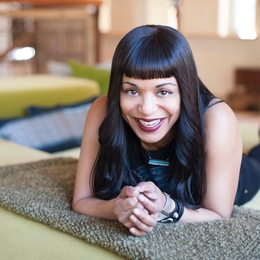
Danielia Cotton has returned from her descent into the darkness and emerged a better, stronger person.
In the course of just a few years, Cotton had to endure a barrage of personal tragedies, one after the next—namely, a late-term miscarriage, a divorce and a battle with thyroid cancer. At the same time, she felt wore down by threats of global terrorism, war and other symptoms of the sick, unstable world around her.
Whereas this string of toxic events might have broken a weaker-willed individual, she chose to deal with everything the only way she knew how: by turning it into art for public consumption.
“A Prayer,” her album released earlier this year, tells a story of rising up, of perseverance and survival. From the music to the lyrics, each of the album’s five songs is rich with beauty, power and hopefulness. Cotton, now cancer free and having reconciled with her former ex-husband, intends to release an encore—an as-yet-untitled companion piece to “A Prayer” that she describes as “two parts of the same journey”— sometime around Christmas.
“I think people will see two different parts of me, I think, but they’ll fit,” says Cotton, a native of Hopewell, N.J., whose distinctive blend of rock, blues and soul has made her a darling of Philadelphia singer-songwriter haven WXPN. “Within what is essentially one album, you’ll see my growth.”
Cotton will return to the Greater Philadelphia Area on Oct. 6 for a performance at the Sellersville Theater. In advance of the show, she took some time to talk about her latest work, her journey through the darkness and how she came out the other side.
Regarding her inspiration for “A Prayer” …
“It was the result of a tumultuous four years, where I was just raw all the way around, and the world kept moving despite my little tragedy. I felt like every time I caught my breath, something else happened—bam, bam, bam. I felt like I was watching my life unravel, and I had to figure out how to get up, but I took a minute of being in the darkness. I just had to take the punch, say, ‘I’m good,’ and keep moving. I started to heal, and that came in song after song. In a sense I was trying to write to face my fear and calm my own self down.
“Apart from everything going on in my own life, ISIS was always in the news. I lived in an apartment in Brooklyn and could see the Freedom Tower [built atop Ground Zero in Lower Manhattan] from where I lived. It was a constant reminder, and I was always afraid. I just sat down and the words came out: ‘There’s a war in the world; it’s getting closer to you.’ I just felt like I wasn’t so far removed from all these horrible things, and the reality of that was frightening.
“With the second half, it will fit with the beginning of ‘A Prayer.’ The second half is going to be a revelation, a personal triumphant moment. I’m OK now, but it took me a minute to deal with it and be in an OK place.”
Regarding music as a tool for understanding the world …
“I think you can’t use an emotion until you deal with it as a person, otherwise it could potentially be a nightmare. If I go to write about any experience or fear I have dealt with, I have to be in a safer place. I can go back to the moment and be true and give the best performance for the people, but I need to go back there safely. I don’t choose to write about things I have not dealt with and resolved in my own way. If I know I’ve made some closure, I’ve enabled myself to put it out there, because I’ve made peace with it. Otherwise I’m just naked. I need to go through it and deal with it before I can let you have it.”
Regarding Philadelphia’s influence on her work …
“Philly was my stomping ground out of college. … My career began because of Dan Reed and those guys at XPN. XPN literally launched my career. I have mad love for Philly—it’s my music home, and it was the birth of me. I remember doing the TLA one of the first times, and I was doing an a cappella version of ‘Philadelphia’ [by Bruce Springsteen] and they let me give them that moment; it was one of those incredible moments in Philly.
“I live in Brooklyn now, and in the last few years I bought a home in Woodstock, [N.Y.] That’s where I wrote a lot of this album. … I bought the house during that dark time, and I fell in love with it. The remnants of what happened there is still there. I’m in the midst of nature there, and the setting allows me to focus in a great way.”
Photograph by Karin Bruno


